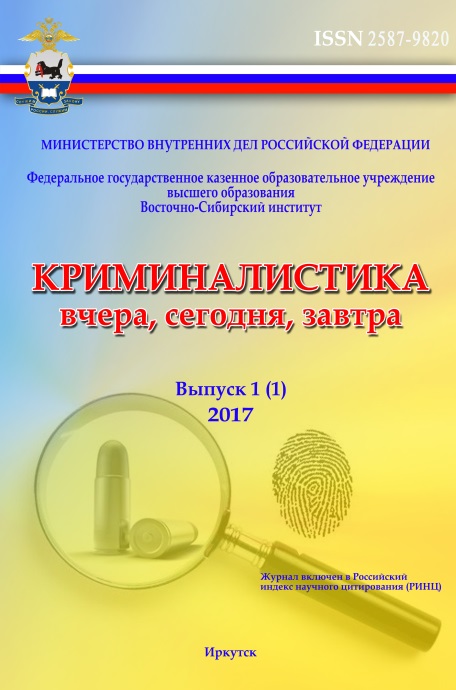UDC 343.9
Abstract. The problems of drug crime at the present stage lie in the widespread introduction of information technologies into the process of committing criminal acts. The drug business, like any legal business, is based on the principles of extracting maximum profit and ensuring safe existence and functioning for the longest possible period of time. These and a number of other principles can be provided by information technologies, namely new economic instruments, such as digital financial assets and digital currencies (cryptocurrencies). Despite the fact that cryptocurrencies, as an information and economic phenomenon, have existed for more than 15 years, many aspects of its generation, functioning, and use, including use for criminal purposes, still remain unexplored. Since cryptocurrencies have a high value on the cryptocurrency market, are accessible to users and are able to provide relative anonymity, they find their spread in the criminal environment. It is the presented factors that indicate the need to study the extent and influence of cryptocurrencies on the criminal drug environment. The author concludes that it is necessary to study cryptocurrencies from a legal, information and technical point of view, since the fight against drug crime requires an integrated approach. It was concluded that in the near future, the most effective way to combat drug crime and introduce cryptocurrency into it is to develop a user identification mechanism based on the modern capabilities of the competent government agencies.
cryptocurrency, digital currency, drug crime, criminal markets for goods and services, information and telecommunication technologies
1. Zemcova S. I. Kriptovaljuta v nezakonnom oborote narkoticheskih sredstv: voprosy deanonimizacii i otvetstvennosti [Cryptocurrency in illicit trafficking of narcotic drugs: issues of deanonymisation and responsibility]. Kriminalistika: vchera, segodnja, zavtra – Criminology: yesterday, today, tomorrow]. 2020, no. 1(13), pp. 54-63. (in Russian).
2. Repeckaja, A. L. Cryptocrime as a consequence of the digitalisation of crime. Cifrovye tehnologii v bor'be s prestupnost'ju: problemy, sostojanie, tendencii : Sbornik materialov I Vserossijskoj nauchno-prakticheskoj konferencii, Moskva, 27 janvarja 2021 goda [Digital technologies in the fight against crime: problems, status, trends : collection of proceedings of I All-Russian scientific-practical conference Moscow, 27 January 2021]. Moskow, 2021, pp. 65. (in Russian).
3. Ivancov S. V., Sidorenko Je. L., Spasennikov B. A. Crimes related to the use of cryptocurrency: main criminological trends [Prestuplenija, svjazannye s ispol'zovaniem kriptovaljuty: osnovnye kriminologicheskie tendencii]. Vserossijskij kriminologicheskij zhurnal – All-Russian Journal of Criminology. 2019, vol.13, no. 1, pp. 85-93. (in Russian).
4. Fil'chenko A. P. Uchet osobennostej obrashhenija kriptovaljuty v processe dokazyvanija prichastnosti lica k nezakonnomu oborotu narkotikov / A. P. Fil'chenko, V. Ju. Zhandrov [Cryptocurrency as an object of criminal-legal and criminological research]. Vestnik Kazanskogo juridicheskogo instituta MVD Rossii – Vestnik of the East-Siberian Institute of the Ministry of Internal Affairs of Russia. 2021, vol. 12, no. 4(46), pp. 566. (in Russian).
5. Alizade V. A. Sudebnaja praktika primenenija st. 174¹ UK RF po delam o narkoprestuplenijah, sovershennyh s ispol'zovaniem kriptovaljuty [Judicial practice of application of Article 174¹ of the Criminal Code of the Russian Federation in cases of drug offences committed with the use of cryptocurrency]. Narkokontrol' – Narcocontrol. 2017, no. 4, pp. 8-14. (in Russian).
6. Muksinova, A. F. Legalisation (laundering) of money acquired as a result of drug trafficking using cryptocurrency. VII Baltijskij juridicheskij forum "zakon i pravoporjadok v tret'em tysjacheletii" : Materialy mezhdunarodnoj nauchno-prakticheskoj konferencii, Kaliningrad, 14 dekabrja 2018 goda [VII Baltic Legal Forum ‘Law and Order in the Third Millennium’ : proceedings of the international scientific and practical conference, Kaliningrad, 14 December 2018]. Kaliningrad, 2019, pp. 169-170. (in Russian).
7. Filchenko A. P., Zhandrov V. Yu. Uchet osobennostej obrashhenija kriptovaljuty v processe dokazyvanija prichastnosti lica k nezakonnomu oborotu narkotikov [Taking into account the peculiarities of cryptocurrency circulation in the process of proving the involvement of a person in illicit drug trafficking]. Vestnik of the Kazan Law Institute of the Ministry of Internal Affairs of Russia - Vestnik Kazanskogo juridicheskogo instituta MVD Rossii. 2021, vol. 12, no. 4 (46), pp. 561-567. (in Russian).
8. Sidorenko Je. L. Narkotiki i kriptovaljuta: mirovye kriminologicheskie trendy [Drugs and cryptocurrency: global criminological trends]. Narkokontrol' – Narcocontrol. 2018, no. 2, pp. 8-13. (in Russian).
9. Pinkevich T. V. Zarubezhnyj opyt protivodejstvija prestupnoj dejatel'nosti s ispol'zovaniem kriptovaljuty [Foreign experience of countering criminal activity with the use of cryptocurrency]. Nauchnyj portal MVD Rossii – Scientific Portal of the Ministry of Internal Affairs of Russia. 2020, no. 3(51), pp. 87-93. (in Russian).
10. Yaya J. Fanusie and Tom Robinson. Bitcoin Laundering: An Analysis of Illicit Flows into Digital Currency Services c.15 [Jelektronnyj resurs] – URL: https://www.fdd.org/wpcontent/uploads/2018/01/MEMO_Bitcoin_Laundering.pdf. (in Russian).










